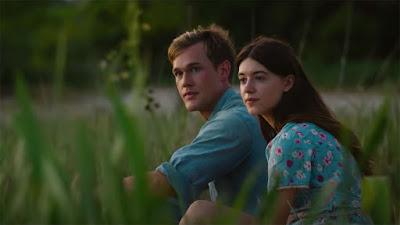Format: DVD from Sycamore Public Library on rockin’ flatscreen.

When award season comes around, there are always those movies that are surprising in the lack of nominations they accrue. That’s very much the case with Where the Crawdads Sing, a film that got a great deal of acclaim that then vanished when awards time came. It’s a more than competently made film, a solid story with a good pedigree, and beautifully directed. It seems like it should have been a natural choice, and yet here we are.
While Where the Crawdads Sing starts with a dead body, it’s a movie that is going to invite immediate comparisons to Nell. Our main character, Kya (Jojo Regina as a child and then Daisy Edgar-Jones for the bulk of the film) lives out in the marshes of North Carolina with her family, headed by her abusive father (Garret Dillahunt). One day, her mother wanders off, and over time, all of her siblings wander away as well. Eventually, her abusive father wander off as well, leaving Kya on her own at the age of seven.
Kya manages to survive on her own by selling mussels at the local store, more or less under the eye of store owners Mabel and “Jumpin’” Madison (Michael Hyatt and Sterling Macer Jr.). Unschooled and unable to read, Kya, called Marsh Girl by the townspeople, lives with minimal contact until she meets Tate Walker (Taylor John Smith), who eventually becomes her love interest. He teaches Kya to read and encourages her to sell her drawings of marsh creatures to a publisher. Tate goes off to college, though, and despite his promises to come back to her, he doesn’t.
Enter Chase Andrews (Harris Dickinson), who steps in where Tate once was and romances Kya to the best of his abilities. Things become serious between them until Kya discovers that Chase is engaged to another woman. Around this same time, Tate re-enters the picture, telling Kya that he left because he knew he would have to choose between her and the marsh against the rest of the world and he wasn’t prepared to do so. Oh, and since Kya has rejected Chase, naturally there is an attempted sexual assault, because we can’t get through a movie like this without that.
All of this is important because that dead body at the start of the film is Chase Andrews, who was found at the bottom of a fire tower, having fallen to his death. Since Kya was known to have had a relationship with him, she is arrested and charged with his murder, although she protests her innocence. Her case is taken by Tom Milton (David Strathairn), who wants to demonstrate that she has a clear and solid alibi and there is substantial evidence of misadventure. But, this is the South in the late 1960s/early 1970s, and Kya is the weird person who lives on the outskirts of society.
A great deal of the plot of Where the Crawdads Sing is very standard, although it also seems right in the wheelhouse of Oscar. A lot of the story here feels a bit predictable, in no small part because it feels like Nell, but without Jodie Foster speaking in tongues. While the “feral child” plot isn’t incredibly common, it does feel like one that has shown up before, often in horror films like Mama or The Little Girl Who Lives Down the Lane.
Where this movie truly excels, though, is in its sense of place. This is a movie that feels rooted in There is an odd sense of the world it presents. Kya seems—and I mean this very much as a compliment—like a part of the natural world around her. She belongs in the marsh she inhabits, and the film very clearly shows that to us. A few centuries earlier, and Kya is handing out herbal remedies and being accused of being a marsh witch. There is a feeling of belonging here, and that the world Kya inhabits is one of a sort of pure, natural neutrality. This is something she talks about in voiceover—that life and death in the marsh is just what it is, and that there is no recrimination or evil in death. It is simply a part of the cycle.
There is a great deal to like in Where the Crawdads Sing. I have to say, though, that I am very much getting frustrated with the sexual assault plot line in movies like this one. I understand that is a real thing, that it happens too often. But I am desperately tired of this being used as the motivating influence for women characters in movies. It’s frustrating to be presented with a character like Kya, who is dealing with stereotypes and prejudice, and then forcing her into a plot that is in many ways its own sort of stereotype. I can’t say it’s lazy on the filmmaker’s part since it’s a part of the book, but it does make me sigh.
Still and all, though, I’m surprised on some level this didn’t wind up on at least one of my Oscar lists.
Why to watch Where the Crawdads Sing: It has a definite, clear, and undeniable sense of place.
Why not to watch: It’s Nell with less gibberish.
